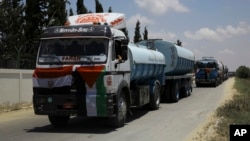Egypt on Wednesday trucked 1 million liters of cheap diesel fuel to the Gaza Strip's sole power plant — a rare shipment that temporarily eased a crippling electricity crisis in the Hamas-ruled enclave but also appeared to undercut Palestinian President Mahmoud Abbas.
Abbas has been stepping up financial pressure on Gaza in hopes of forcing the militant group Hamas to cede ground in the territory. Hamas seized Gaza from Abbas' forces in 2007.
The power plant stopped operating in April after Hamas could no longer afford to buy heavily taxed fuel from Abbas' West Bank-based government, leaving Gazans with just four hours of electricity a day.
Abbas also asked Israel to reduce the electricity it sends to Gaza, which amounts to about a third of the territory's needs. This electricity, paid for by the Abbas government, has been reduced by one-fourth since Monday, worsening the crunch.
The power shortage has cast a pall over the current holy month of Ramadan, when Muslims often end their dawn-to-dusk fasting with lavish family meals. With their homes in the dark and refrigerators not functioning, families have had to scale back the celebrations.
Yousef al-Kayali, a Hamas finance official, said 11 trucks delivered the fuel on Wednesday. He said a second shipment of an additional 1 million liters was expected by Thursday.
The fuel will not solve Gaza's electricity woes, however. Israel is now providing just 88 megawatts of power each day, down from 120 megawatts earlier this week. The Egyptian fuel is expected to provide about 50 megawatts of power each day for several days, making up the cut in Israeli supplies.
In all, Gaza requires about 400 megawatts to meet its daily needs. The hot weather and Ramadan have increased demand, adding to the shortages.
"There will still be troubles, but not the maximum troubles. Re-running the power plant is better than keeping it shut down," said Fathi Sheikh Khalil, director of the Hamas-run energy authority.
It was not clear whether the Egyptian deliveries were a one-time gesture or would continue.
Egypt and Hamas have had cool relations since the Egyptian military overthrew former Islamist President Mohammed Morsi in 2013. The new Egyptian government accuses Hamas of cooperating with Islamic militants in Egypt's Sinai desert.
But earlier this month, Egypt hosted a delegation of top Hamas officials. The delegation also met Mohammed Dahlan, an exiled Palestinian leader and a rival of Abbas. Those talks led to the fuel shipments.
"Our relationship with Egypt is getting better and Egypt showed high understandings of the crisis in Gaza," said Khalil al-Hayya, a senior Hamas official. "We agreed with Dahlan's group on finding solutions to the humanitarian crisis."
Dahlan, 53, was a Hamas foe when he led Palestinian Authority forces in Gaza before Hamas routed them in 2007 and took over the seaside strip. But after a falling out with Abbas in 2011, he and Hamas now have a common foe.
Dahlan is interested in making a comeback to the Palestinian politics through Gaza, where he has support among wide slices of Fatah members.
Egypt is also interested in tempting Hamas to secure the border between Gaza and northern Sinai, where the Egyptian military has been fighting mounting insurgency by Islamic extremists.
Abbas has been stepping up pressure on Hamas for several months. Earlier this year, he reinstated taxes on diesel shipments for Gaza's power plant. The cash-strapped Hamas authorities were unable to pay for the fuel.
Abbas also slashed salaries of tens of thousands of former staff in Gaza to further hurt the faltering economy. And then he asked Israel to cut electricity supplies to Gaza by 40 percent.
With no other options, Hamas has turned to Dahlan, its longtime enemy.
"If we have the money, we would not have gone to Dahlan's people," al-Hayya said.
The talks between Hamas, Dahlan and Egypt have angered Abbas.
"I'm surprised, because they [Egypt] are a member of a coalition that considered Hamas a terrorist movement, and despite that, they had these meetings and agreements,'' Jamal Muheisin, a senior member of Abbas' Fatah party.




